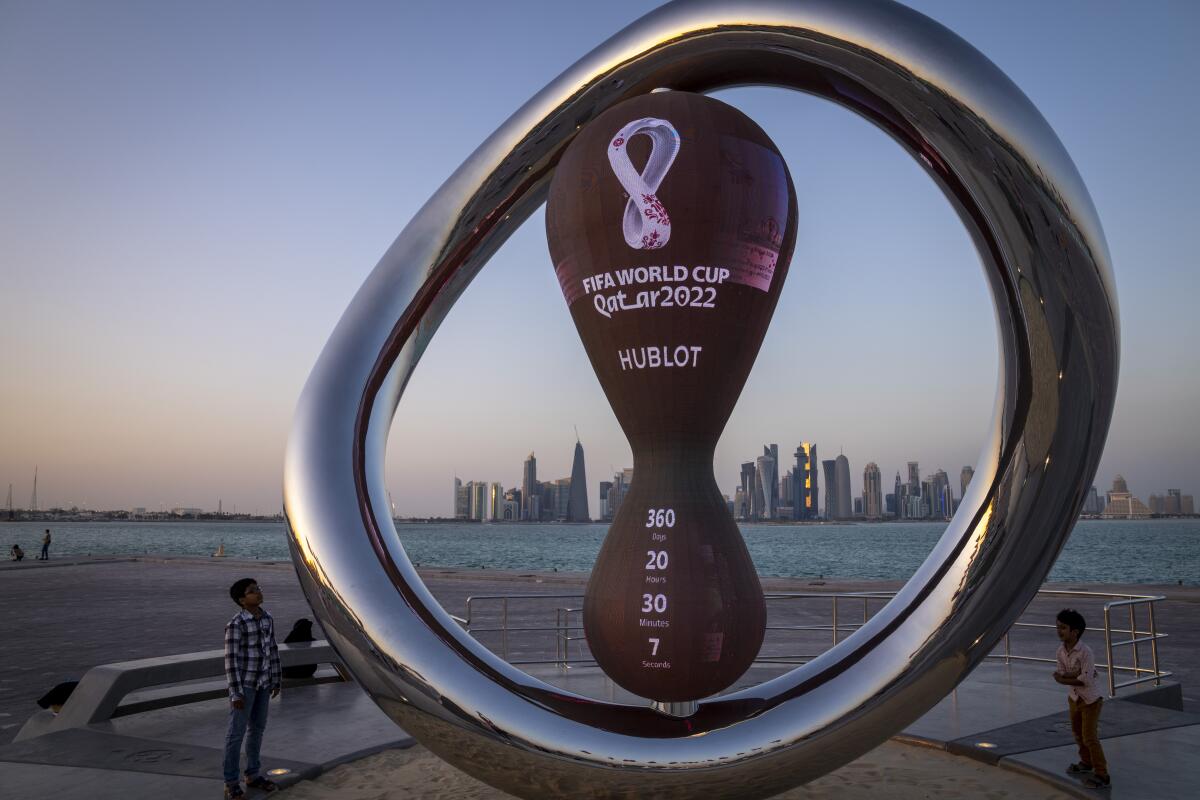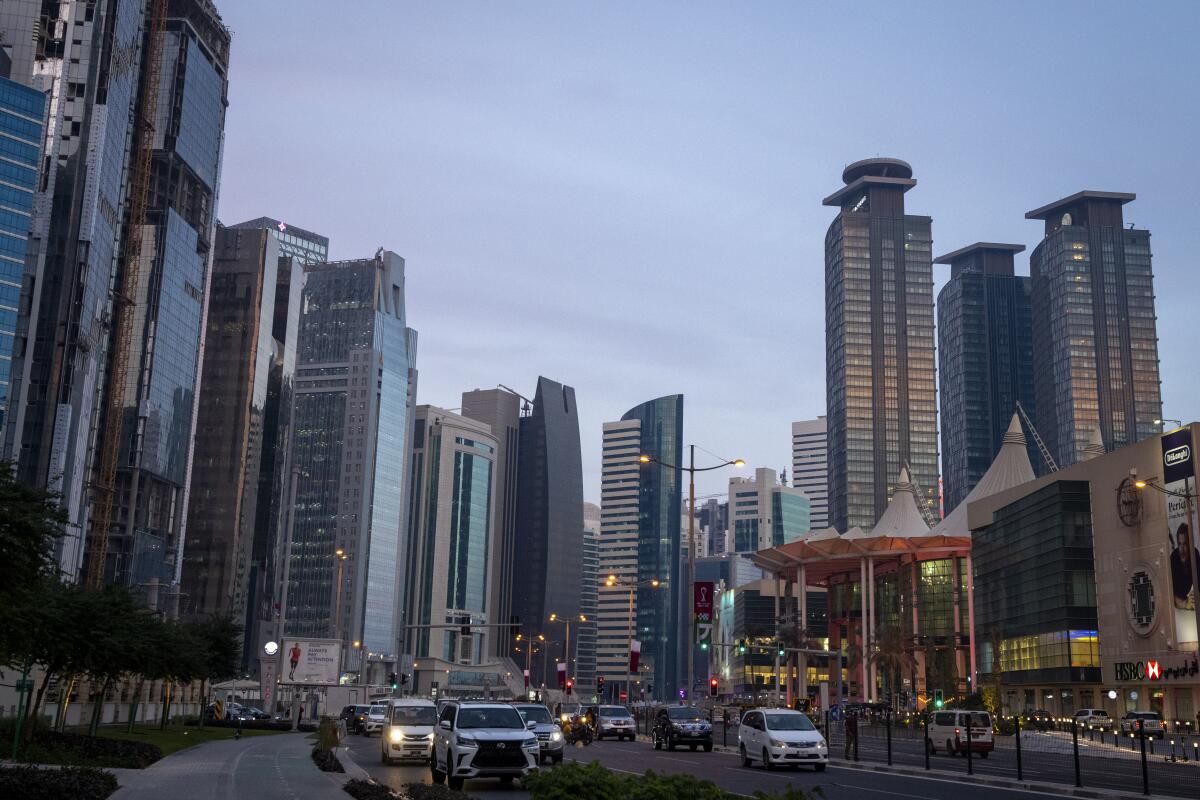Qatar excited to welcome and show world its transformation during World Cup

- Share via
The Qatar World Cup is just nine months away, which is both good and bad news for Fatma Al-Nuaimi, the communications director for the local organizing committee.
“I’m excited because, you know, you always have these things on paper. Now you’re seeing things coming into reality,” Al-Nuaimi said over breakfast Tuesday in a quaint Los Feliz diner. “But I’m having this mixed emotion because I do have an international team working with me. And I’m not going to have the same team together. This is the saddest part.”
Al-Nuaimi isn’t the only one experiencing mixed emotions as the first World Cup to be played in the Middle East approaches. Because while the Qataris, who have had 12 years to plan for the event, are promising the most fan-friendly tournament in history, the rest of the world isn’t so sure.
The small, conservative Islamic country, which is heavily influenced by Sharia law, has prohibitions against alcohol, homosexuality and public displays of affection; boisterousness and intoxication, meanwhile, are widely frowned upon. Not exactly a festive atmosphere for a monthlong celebration that will draw hundreds of thousands of sometimes rowdy visitors who have different values.
Al-Nuaimi, in response, asks for patience and an open mind. Hospitality, after all, is also a pillar of Islam.
“Whenever we have a guest, we need to take care of our guests,” said Al-Nuaimi, whose official title, executive communications director of the Organizing Committee of the Qatar 2022 World Cup, known officially as the Supreme Committee for Delivery & Legacy, doesn’t really fit on a business card.
“A lot of people are excited to welcome the world,” continued Al-Nuaimi, one of the Qatari committee’s few official spokespeople. “This is an opportunity for us to show people around and show people [our] true colors.”
When Mia Fishel left school after her junior year to turn pro, everyone assumed she was going to the NWSL. She chose Mexico’s Liga MX Femenil instead.
More than 17 million ticket requests for the 64 World Cup matches were received during the initial 20-day sales period which ended earlier this month, according to FIFA, which oversees the tournament. Applicants will be notified in early March if their requests were successful, and once that notice is received, they will be able to access an online portal to arrange for accommodations ranging from five-star hotels to camp sites.
The Qataris are expecting 1.5 million visitors to flood the capital of Doha, a city of 2.4 million, beginning in mid-November. To house them, high-rise hotels and apartments have been built, two cruise ships will be docked along the city’s waterfront, accommodations in private homes have been secured and a number of “glamping” camps — a combination of glamour and camping that offers a rare desert experience — have been set up.
Qatar’s tiny size — the country is smaller than the state of Connecticut — means that some of the eight World Cup stadiums are within three miles of one another while the farthest are separated by less than 50 miles.
A sprawling fan fest will be set up along Doha’s scenic Corniche, or bayside promenade, where alcohol will be sold — Budweiser, after all, is among the World Cup sponsors. Alcohol will also be available in designated “fan zones” outside stadiums and in other hospitality venues but Qatari officials, who are being lobbied hard by FIFA to expand alcohol sales, have yet to say whether Budweiser products will be available inside the venues. Alcohol sales are typically banned at restaurants not associated with a high-end hotel or resorts although that could also be relaxed during the World Cup.
Qatari organizers are working to thread the needle on other issues as well. Although homosexuality is illegal in Qatar and punishable by jail , Nasser Al Khater, the chief executive of the tournament’s organizing committee, promised everyone will be welcomed at the tournament, a pledge Al-Nuaimi repeated.

“I’m not going to speak about legislation because I’m not a legislator,” she said. “But when it comes to events, everybody’s welcome. Regardless of whether people are heterosexual or gay … We have hosted, since we won the [World Cup] bid, like 600 international events. And that one issue has [not] come up, of people feeling discriminated or people feeling unsafe.”
Still that question, Al-Nuaimi added, is one she repeatedly has to answer. Her most common response is to invite people to come to Qatar and see for themselves.
“What we are hoping after hosting such a tournament and people have come and had a first-hand experience, is that this perception might change,” she said. “It’s not only Qatar. But the whole Middle East, we feel like we are a part of the world that we have been misunderstood.”
The tournament is a high-stakes gamble for Qatar. The country has spent about $200 billion on new roads, airport expansion and other projects including the construction of stadiums, hotels and a public-transportation system. Many of those projects have been widely criticized by Amnesty International and others for exploiting foreign workers, leading to proposed changes in the kafala or sponsorship system, which to binds migrant workers to their employers and gives them few rights.
The labor reforms, along with much of the construction that has transformed Doha since the World Cup bid was approved in 2010, was inevitable, many Qataris say. But inviting the world to come visit for a month greatly accelerated the work and has forced the country to take a hard, critical look at its labor and human rights record.
So far the U.S. has seen young players Ricardo Pepi, Yunus Musah, Antonee “Jedi” Robinson and Brenden Aaronson, among others, emerge from relative obscurity with brilliant performances.
And that, combined with a more nuanced understanding of the country Qataris hope visitors take home with them, will make up an even greater investment in the future than the anticipated $20 billion in economic activity the tournament is expected to generate.
“Worker welfare will be one of the biggest social legacies after the event,” Al-Nuaimi said. “It’s part of our national vision, of how we can look into social development when it comes to workers’ rights and the reform that is happening in the country. The World Cup helped in actually accelerating all of that.
“You can see there’s a lot of things that happened within the last 10 years. There’s still more improvement to happen. But there has been a lot of great progress. For Qatar, as a nation, it is very transformative.”
More to Read
Go beyond the scoreboard
Get the latest on L.A.'s teams in the daily Sports Report newsletter.
You may occasionally receive promotional content from the Los Angeles Times.










